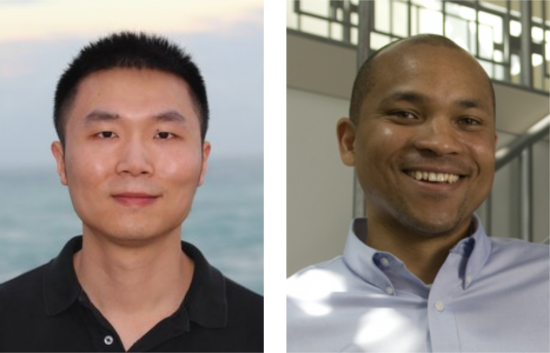AI Seminar
Towards Encyclopedic Visual Understanding & Improved Perception of People and Scenes for Robots
Add to Google Calendar

Jia Deng:
What is needed to achieve encyclopedic understanding of visual scenes, that is, not only passing a "visual Turing test" , but also surpassing humans in terms of the depth and breath of knowledge? A solution will likely require a tight integration of perception, cognition, and language. I will discuss recent work and ongoing projects in this direction.
Chad Jenkins:
"in order for people to fluently program autonomous robots, a robot must be able to interpret commands that accord with a human's model of the world. The challenge is that many aspects of such a model are difficult or impossible for the robot to sense directly. We posit the critical missing component is the grounding of symbols that conceptually tie together low-level perception with user programs and high-level reasoning systems. Such a grounding will enable robots to perform tasks that require extended goal-directed autonomy as well as fluidly work with human partners.
Towards making robot programming more accessible and general, I will present our work on improving perception of people and scenes to enable robot learning from human demonstration. This talk will cover our work in physics-based human tracking from video and its extension to learning from human demonstration, Controller Capture. I will also discuss or our recent work to develop the Axiomatic Particle Filter, bridging probabilistic scene estimation with symbolic goal-directed decision making, for goal-directed robot learning from demonstration."
Jia Deng:
Jia Deng is an Assistant Professor of Computer Science and Engineering at the University of Michigan. His research focus is on computer vision and machine learning. He is a recipient of the Yahoo ACE Award, a Google Faculty Research Award, the ICCV Marr Prize, and the ECCV Best Paper Award.
Chad Jenkins:
Odest Chadwicke Jenkins, Ph.D., is an Associate Professor of Computer Science and Engineering at the University of Michigan. Prof. Jenkins earned his B.S. in Computer Science and Mathematics at Alma College (1996), M.S. in Computer Science at Georgia Tech (1998), and Ph.D. in Computer Science at the University of Southern California (2003). He previously served on the faculty of Brown University in Computer Science (2004-15). His research addresses problems in interactive robotics and human-robot interaction, primarily focused on mobile manipulation, robot perception, and robot learning from demonstration. His research often intersects topics in computer vision, machine learning, and computer animation. Prof. Jenkins has been recognized as a Sloan Research Fellow in 2009. He is a recipient of the Presidential Early Career Award for Scientists and Engineers (PECASE) for his work in physics-based human tracking from video. His work has also been supported by Young Investigator awards from the Office of Naval Research (ONR) for his research in learning dynamical primitives from human motion, the Air Force Office of Scientific Research (AFOSR) for his work in manifold learning and multi-robot coordination and the National Science Foundation (NSF) for robot learning from multivalued human demonstrations.
 MENU
MENU 
